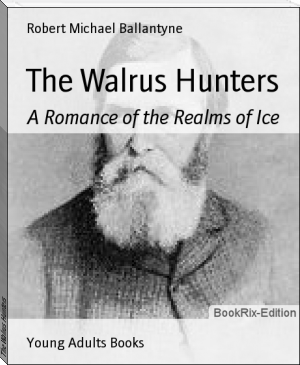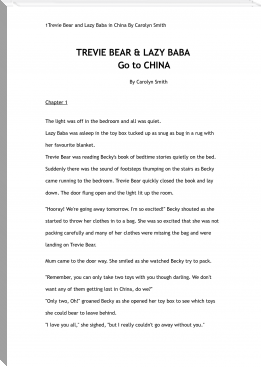The Walrus Hunters - Robert Michael Ballantyne (best book clubs .txt) 📗

- Author: Robert Michael Ballantyne
Book online «The Walrus Hunters - Robert Michael Ballantyne (best book clubs .txt) 📗». Author Robert Michael Ballantyne
The Eskimo showed all his brilliant teeth from ear to ear while this little speech was being made. Then he accompanied Adolay through the bush until they reached the shores of a small lake, beside which a birch-bark canoe was lying, partly in the water. At an earlier part of that evening the girl had placed the canoe there, and put into it weapons and provisions suitable for a considerable voyage.
"You have got this ready for me?" said Cheenbuk.
"Yes. You saved my mother's life once, and I will save yours," replied the girl, pointing to the bow of the canoe as if ordering him to embark.
"Are you going with me?" asked the youth, with a look of hopeful surprise and a very slight flutter of the heart.
"You do not know the lake. I will guide you to the place where the little river runs out of it, and then, by following that, you will get into Greygoose River, which I think you know."
The Eskimo's heart ceased to flutter, and the hope died out of his expressive eyes as he said, still hesitating, "But--but--I am very heavy and you are very light. A canoe does not go well with its head deep in the water. Don't you think that I should sit behind and steer?"
"And where would you steer to?" asked Adolay, with a somewhat pert smile. "Besides, look there," she added, pointing to the stern of the little craft, "do Eskimos not use their eyes?"
Cheenbuk used his eyes as directed, and saw that a heavy stone had been placed in the stern so as to counteract the difference of weight. With an air of humility, therefore, he stepped into his allotted place, took up a paddle and sat down. Adolay pushed the craft into deeper water, stepped lightly in, and, giving a vigorous shove, sent it skimming out on the lake. Then the two dipped their paddles with a will, and shot over the water like an arrow.
Profound silence was maintained until the other end of the lake was reached, when the moon came out from a bank of clouds and enabled the girl to find the reedy source of the little river without difficulty.
"We will land here and lift the canoe past the reeds," she said, steering the little craft to the side of a grassy bank.
Walking along this bank, and guiding the canoe with their hands, they soon came to an open space in the forest, whence they could see the rivulet winding like a thread of silver through the land in front of them.
"This is the place where we must part," said Adolay with a sudden determination of manner which surprised and puzzled the Eskimo. "You have now no further need for me. You have only to go straight on with the running of the water. There are only two falls on the way, but you will hear the noise before you come to them, and you have only to lift the canoe a short way through the bush to the still water below the falls. Our braves often do that; you will find it quite easy."
"I know something of that," returned Cheenbuk; "we have no falls in our great salt lake, but we have plenty big lumps of ice, and when these are like to crush together we have to jump out of our kayaks and lift them out of the water--ho! and we do it quick too, sometimes, or we get squeezed flat. But if I go on with the canoe how will you get home? You cannot swim back."
"I can walk round the lake. Are the Eskimo girls not able to walk, that you ask such a question?" said the girl, raising her dark eyes with something of an amused look to the face of her companion, who was looking anxiously down at her.
"Oh yes, they can walk well. Ay, and run too when needful. But--but-- I'm sorry that we must part. Must!--why must?"
The youth said this in a meditative tone, for it had occurred to him for a moment that the girl was now in his power; that he could compel her to get into the bow of the canoe, and might steer her to his home at Waruskeek if he chose, whether she would or no. But Cheenbuk's soul was chivalrous. He was far in advance of his kindred and his times. He scorned himself for having even thought of such a thing for a moment; and it was with an air of profound humility that he continued--
"Must--of course you must. One of the young braves would have a sore heart if you did not return."
"No one that I know of," she replied quickly. "I care not for the braves; but my mother would have a sore heart if I did not return. Yet I fear to go back, for that Idazoo will tell, and perhaps they will kill me for helping you to escape."
"Then you must _not_ go back," said the Eskimo stoutly. "Come with me and I will take good care of you."
"No, I cannot," returned the girl thoughtfully; I cannot forsake my mother and father in such a way without even a word at parting.
"What is your name?" asked the youth promptly. "Mine is Cheenbuk."
"They call me Adolay; that, in our language, means the summer-time."
"Well, Adolay, I don't know what my name, Cheenbuk, means--perhaps it means winter-time. Anyhow, listen to me. If there is any chance of you being killed you must _not_ go back. I will take you to my mother's igloe and you will live with her."
"Have you, too, got a mother?" asked Adolay with interest.
"Ho! yes; and a father too--and they're both fat and heavy and kind. When they come to know that you have been so kind to me, they will receive you with joy."
"No," said Adolay, shaking her small head decidedly, "I _will_ not go. They may kill me if they like, but I will never forsake my mother."
"Are you determined?"
"Yes--for sure."
"Then so am I," said Cheenbuk, taking hold of the canoe and turning the bow up-stream. "Get in, Adolay, and we will return to the lodges of your people and die together."
Cheenbuk had a way of saying and doing things that convinced his hearers that he was thoroughly in earnest. The Indian girl felt this, and regretted much that she had said anything at all about her danger. She now tried to counteract the evil.
"What do you mean?" she said, anxiously.
"I mean that I am not afraid to go back and die with you."
"But it is not certain," she replied, "that they will kill me. If my father was at home they would not dare to do it, and perhaps they will be afraid of his revenge when he comes back. But for you there is no chance at all. They will be sure to kill you with slow tortures."
"I care not. If I go back they will not be so likely to kill you. But listen to me, Adolay. I have a thought. If you come with me to my home in Waruskeek I will take you safe to my father's igloe, and you shall live with my mother and sister. I will not ask you to be my squaw, but you will stay with them till we collect a strong band of young men, when we will go to visit your people and take you with us. If they are friendly--well, and we can traffic together. If they receive us ill there will be a fight--that is all. I do not like fighting--but whatever happens I promise that you shall be restored to your father and mother. Now, will you go?"
Adolay looked up earnestly into the grave countenance of the young man. There could be no doubt of his thorough sincerity--she felt that--still, she hesitated. It was a bold step to take--even for an Indian heroine!
At that critical moment there broke upon their ears a distant sound that caused them both to start and look round anxiously. It was faint, and so far away that at first they could make nothing of it. A few seconds later it was repeated louder than before. Then a look of intelligence broke over Adolay's countenance.
"I know!" she exclaimed, "Idazoo is shrieking! We should have put the cloth over her nose! She has got her mouth free and--"
Another sharp yell rendered it needless for her to complete the sentence.
"Come," she said, laying hands on the canoe. "Turn it round. We will go!"
A few minutes more and the pair were flying down the swift current of the little river as fast as they could dip their paddles in the stream.
CHAPTER TEN.
A WILD CHASE AND A BAD FAILURE.
It does not necessarily require the influences of civilised life to make an honourable, upright man, any more than it needs the influences of savage life to make a thorough scoundrel. Of course the tendency of civilisation is to elevate, of savagery to debase, nevertheless it is certain that as we occasionally see blackguards in the highest ranks, so we sometimes find men and women with exalted conceptions of right and wrong in the lowest circles of life.
The truth would seem to be that the Spirit of God is not confined to ranks or conditions of men--a fact that appears to be confirmed by the Scripture statement that "in every nation he that feareth God and worketh righteousness is acceptable to Him."
Cheenbuk's mind must assuredly have been influenced by a good spirit when, after descending the little river at the utmost speed possible--so as to render recapture for a time at least improbable--he directed his companion to run the canoe on the bank in an eddy formed by a flat rock, and then, against his own most earnest desires, advised Adolay to return to her people.
"While we were paddling down-stream," he said, "I have been thinking much, and I cannot believe that your people would be so hard as to kill you for only helping a poor Eskimo to escape. Now, I have changed my mind. I have often found that it is better to think more than once before acting, if you have time to do so. What I think now is, that we should hide the canoe here, and return to your village on foot together. When we get there--or when we meet them chasing us--you will go on, and I will hide to see how they receive you, and if they receive you kindly--as I feel sure they will do--I will return here to this spot, take the canoe, and go to my home alone. I cannot bear to take you from your father and mother. I think the Great Spirit, who is the father of all, would be angry with me. But I will not force you to return if you are afraid."
"I am afraid," returned Adolay, quickly. "You do not know how angry the men will be: and you don't know how sharp their eyes are. If you were to return with me they would see you





Comments (0)